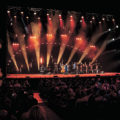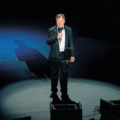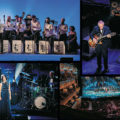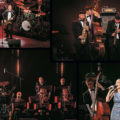- Фото: © rg.ru
- Фото: © rg.ru
- Фото: © rg.ru
- Фото: © rg.ru
On October 1, the day of the 100th anniversary of Russian jazz, the main theater of the country performed this music for the first time. The Igor Butman Foundation, with the support of the Cultural Initiatives Foundation and the Ministry of Culture, gathered the best musicians all over Russia: the youth and veterans, symphonic jazz and electronics, the newest and what has stood the test of time.
The Oleg Lundstrem Orchestra was the first to take the stage, being only 10 years younger than Russian jazz. In 1932, the 18-year-old son of Russian emigrants bought a Duke Ellington record in a Harbin store and soon gathered his friends in the Green Crocodile jazz orchestra. Over the 80 years of its existence, the Lundstrem Orchestra has survived various cultural periods and has brought up a range of famous musicians such as Aida Vedishcheva, Valery Obodzinsky, and Igor Butman. The Lundstrem Orchestra enabled the current movie star Anya Chipovskaya to come onto the stage of the Bolshoi. Her voice and talent enabled Anya to perform Ella Fitzgerald’s hit “The Man I Love”.
Bursting into applause in the middle of an opera or ballet performance is not welcome. However, that evening, the historical hall of the theater was reverberating with endless applause: in jazz, the audience applauds to the musicians during the performance. And there was a good reason for it! How can one remain calm listening to David Goloschekin’s violin pizzicato?! The founder of the St. Petersburg Academy of Jazz, a professor at the Herzen Pedagogical University, at the age of 78, David Goloschekin can engage all instruments into his favorite genre. Besides the violin, he plays jazz on the harp, double bass, vibraphone, and the Hammond organ. To the audience’s surprise, Ural Dixieland soloist Kristina Ryzhkovskaya began singing “Bourbon Street Blues” in the loudspeaker, and next, her contralto sounded in full force.
The audience greeted Aleksei Kozlov with a long standing ovation the moment he appeared on stage. The great saxophonist, who had performed for the first time at the Tartu Festival in 1960, demonstrated that he and his band Arsenal could play anything from jazz rock to breakdance. That night, Aleksei Kozlov quietly and sincerely played variations on the theme of Borodin’s Polovtsian Dances in a duet with the piano.
“Jazz is becoming more and more significant for music and people in our country,” said Igor Butman. “It is studied in schools and music colleges, a huge number of festivals are held all over Russia, and today I see young beautiful people in this hall and on other stages, who play a way better than I did when I was their age.”
At the end of the concert, the Butman Moscow Jazz Orchestra accompanied a trio consisting of blind pianist and singer Oleg Akkuratov, who sang a fast scat (a recitative with no words, but separate syllables and sounds), Igor Butman himself, and a young saxophonist of his orchestra Oleg Chekurov. They had a friendly improvisation competition, and naturally, friendship won in the end.
This concert at the Bolshoi Theater is not the only celebration of the anniversary of Russian jazz. On October 15, the Khudozhestvenny cinema in Moscow showed the documentary film “Jazz 100” for the first time, and a book with the same title is to be released in December. In addition, gala jazz concerts will be held in 18 Russian regions from Kaliningrad to Yuzhno-Sakhalinsk. Finally, a street called Dzhazovy Proezd (Jazz Drive) may soon appear in Moscow.
Andrey Vasyanin, Rossiyskaya Gazeta




